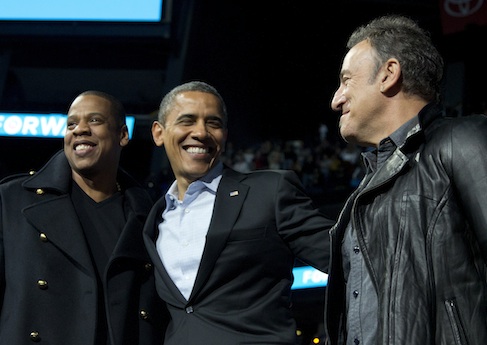America might have just missed out on Richard Nixon’s psychedelic rock album, according to Tevi Troy. In his new book, What Jefferson Read, Ike Watched, and Obama Tweeted: 200 Years of Popular Culture in the White House, the presidential historian and former Bush administration official writes that Grace Slick, Jefferson Airplane’s lead singer, attempted to crash a White House reception for Finch College graduates—a group that included both Slick and Nixon’s daughter, Tricia—with a plan to spike the president’s tea with LSD.
Though White House security rebuffed Slick (accompanied by Abbie Hoffman), the incident nonetheless demonstrates the often-antagonistic relationship of presidents to popular culture. With a wide scope—from the Founding to the present—Troy attempts "an exploration of how presidents have made use of a multiplicity of cultural pursuits … and how those pursuits have in turn shaped them and the nation."
Troy’s focus on individual presidencies, along with a helpful appendix at the end, also makes the book a guide for aspiring presidents. The thesis he defends is that "the leader of a free and democratic nation must appear to be engaged in his country’s culture, but he must do so without letting the coarseness and vulgarity of that culture diminish himself or his office."
In the late-eighteenth and nineteenth centuries, during what media critic Neil Postman called the "Typographic Age," presidents prospered mostly from sheer literacy. Of the Founders, Troy writes, "History has rarely produced such an impressive constellation of luminaries at such a critical moment." Lincoln, too, earns special praise, not only his voracious reading, but also for managing not to condescend to the vulgar, and for moderating two leadership extremes. "While every president needs a little John Quincy Adams to govern wisely," Troy writes in reference to the aloof sixth president, "he needs a little Andrew Jackson to get elected."
The rise of mass communication in the twentieth and twenty-first centuries, however, diminished (but did not eliminate fully) the importance of literacy in favor of a carefully cultivated visual image. Presidents still privately engaged with popular culture, as they had done in earlier decades, but managing public perceptions became more important.
Some presidents comfortably fit into this new paradigm. Troy says that FDR "proved the original master of this new pop culture," most prominently through his fireside chats, "and none of his successors has excelled him." But some have come close: JFK through a great PR team whose efforts, including attending a concert featuring Spanish cellist Pablo Casals, established him as a public intellectual; Ronald Reagan, whose years of experience in radio, television, and film enabled him to project a positive public image despite a mostly antagonistic press; and Bill Clinton, who shared the tastes of his Baby Boomer generation.
Others have not been so lucky. The negative feedback from Harry Truman’s surreal piano gig at the National Press Club while he was still FDR’s vice president forced Truman to conclude that he "couldn’t be Harry Truman and vice president at the same time." Nixon’s attempt to associate himself with country star Merle Haggard to rebuff a musical counterculture loathsome of him also fell flat. And Gerald Ford could not escape the SNL-produced perception of him as a klutzy dunce, despite being easily the most athletic modern president.
Barack Obama, who, Troy argues, has plugged himself more into American popular culture than any other president, ends the book’s historical narrative. And by this conclusion, Troy has expertly digested, compressed, and relayed an immense amount of historical material on both presidential tastes of and interactions with popular culture.
Still, I was left with some lingering questions. Is our popular culture better or worse off, for example, when "…public figures can no longer write their own speeches or books; and there is some evidence that they can’t read them either," as Gore Vidal acerbically remarked? With mass communication, can presidents supersede checks and balances and ignore Congress, as Woodrow Wilson argued and Obama has repeatedly tried? And how did a counterculture so hostile to the presidency in the 60s become so chummy with it that rocker Joe Cocker could say, of Bill Clinton’s presidency, that "[f]or a president to be associated with rock and roll is kind of cool"?
To be sure, asking a single book to answer all of these questions is too much. I look forward to seeing how Troy addresses them in the sequel to this fascinating and worthwhile read.
